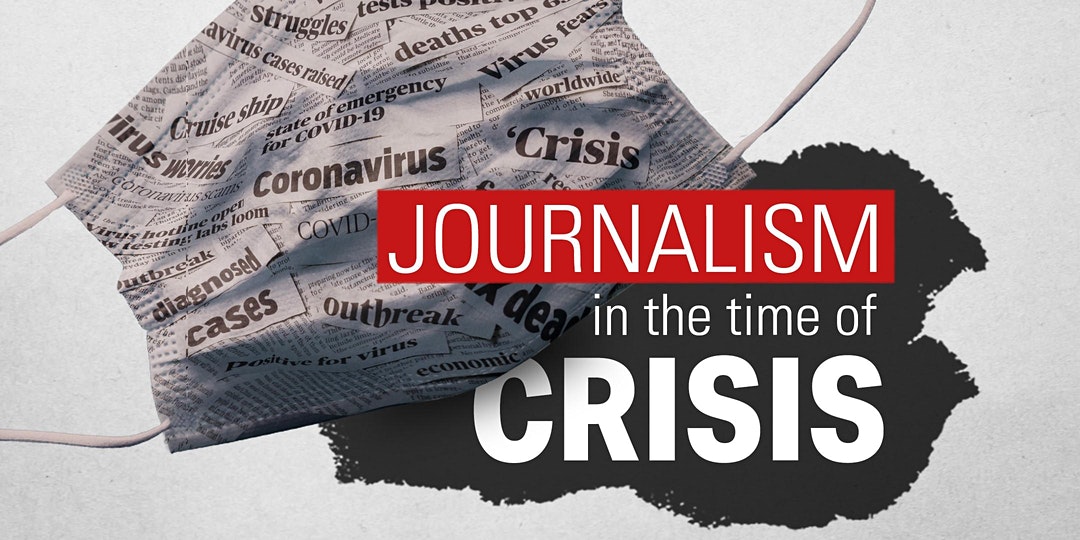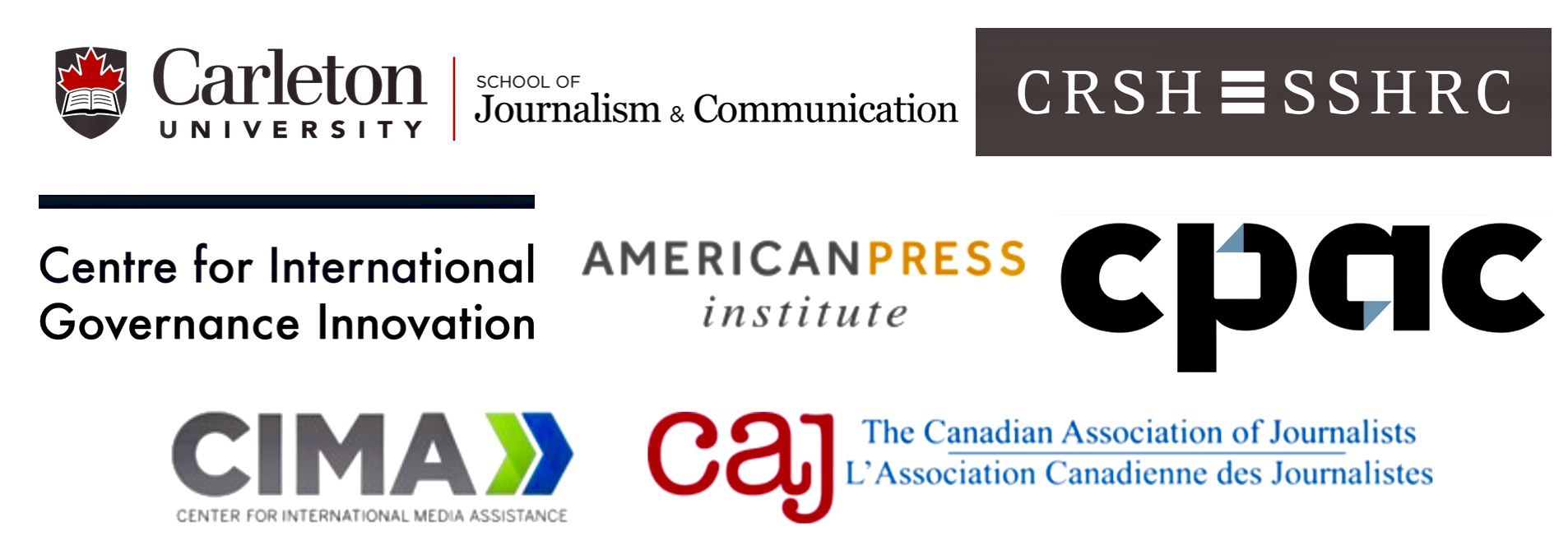
Journalism In the Time of Crisis is an international research project initiated by the journalism program at Carleton University’s School of Journalism and Communication to establish and engage with a global network of experts to look at the nexus between journalism and the COVID-19 pandemic in an effort to find lessons for journalism practice in the future.
Carleton’s journalism school, the oldest in Canada, was founded in October 1945 in the wake of the Second World War, and we launched events marking the 75th anniversary of the school’s establishment with an international online forum: Journalism in the Time of Crisis convened Oct. 22-23 by Carleton. This major international conference, held via Zoom, forged an international network around the question of journalism and the pandemic, brought together key experts with students and young scholars and will produce a digital platform and major publication. We also plan to continue to engage the research community on the COVID-19 crisis going forward by developing an agenda for future research and collaborations. The online forum also featured an international town hall for journalism students and a discussion of how journalism curriculum could be adapted to include new educational tools to teach journalism students and practicing journalists essential skills for crisis reporting.
Journalism as an industry and a profession was already experiencing a crisis when the COVID-19 pandemic plunged the world into a state of deep uncertainty. And yet, people around the world have turned to journalists to help them make sense of the most significant social and economic crisis of our generation. This project explores the fascinating intersection of journalism and the COVID-19 crisis to assess both the short and long-term impacts. We examined such issues as the role journalists have played during the pandemic, the impact of the crisis on journalism practice and business models, the ongoing contest between journalism and misinformation, the future of local news, threats to global media freedom, the impact in the global South and the implications for journalism education.
Follow us on social media
#cujournalism75
NEW: Transcript of the Conference Proceedings
Download [PDF Format]
Journalism in the Time of Crisis – Conference Agenda
Note: All times listed in Eastern Daylight Time (GMT+4)
Thursday, October 22, 2020
8:45 AM Opening
Symposium chair Allan Thompson, head of the journalism program at Carleton University, will set the stage for the two-day event.
- Speaker: Allan Thompson, Carleton University
9:00 AM Practitioner Keynote: Ed Yong
In 2018, Atlantic staff writer Ed Yong wrote a chilling article that revealed the world was unprepared for a coming pandemic. Since the arrival of Covid-19, Yong has continued to produce a collection of deeply researched, literary pieces that have investigated the biology of the novel coronavirus, the spread of misinformation about it and the Trump Administration’s alarmingly flawed response to the pandemic. In a Q&A, Yong discusses his journalism, the trajectory of the pandemic, the politicization of science, and the rise of misinformation at this precarious moment in history.
- Speaker: Ed Yong, The Atlantic
10:00 AM Research Keynote: Richard Fletcher
Richard Fletcher is a Senior Research Fellow and leader of the research team at the Reuters Institute for the Study of Journalism, at the University of Oxford. He will review the highlights of a major Reuters study, Navigating the Infodemic. Researchers used survey data to document and understand how people in six countries (Argentina, Germany, South Korea, Spain, the UK, and the US) accessed news and information about COVID-19 in the early stages of the global pandemic, how they rate the trustworthiness of the different sources and platforms they rely on, and how much misinformation they say they encounter.
- Speaker: Richard Fletcher, Reuters Institute for the Study of Journalism
10:45 AM Panel: Watchdog vs. Megaphone
In the midst of the pandemic, how do journalists balance their responsibility to amplify public health directives to combat the virus with their responsibility to challenge political leaders and public health officials?
- Moderator: Randy Boswell, Carleton University
- Speakers:
- Obi Anyadike, The New Humanitarian
- Aaron Derfel, Montreal Gazette
- Charelle Evelyn, The Hill Times
- Evan Solomon, CTV
12:15 PM Public Policy Keynote: Dr. Theresa Tam
Dr. Theresa Tam, who has been Canada’s Chief Public Health Officer (CPHO) since 2017, has become the public face of the federal government’s efforts to contain COVID-19. She is a physician with expertise in immunization, infectious disease, emergency preparedness and global health security. And while she has become a national figure for her near-daily media appearances and pandemic briefings for reporters, Dr. Tam has very rarely spoken at any length about her own views on the role of the media during the crisis. This keynote will provide her with that opportunity.
- Moderator: Josh Greenberg, Carleton University
- Speaker: Dr. Theresa Tam, Canada’s Chief Public Health Officer
1:00 PM Panel: Public Trust and the Role of Journalists
How has public trust during the pandemic been affected by the media coverage, scientific uncertainty, and public health messaging? COVID-19 has put public trust in institutions – including the news media – under the spotlight, and this panel examines some of the challenges and opportunities.
- Moderator: Scott Mitchell, Carleton University
- Speakers:
- Dr. Vera Etches, Ottawa Public Health
- Jayme Poisson, CBC Radio
- Chris Waddell, Carleton University
- Cary Wu, York University
Panel: Journalism, the Pandemic, and the Global South
What are the short and longer term implications of COVID-19 for journalism in the global south? Panelists discuss partnership strategies, financial sustainability, media start-ups, trends, developments, and opportunities.
- Moderator: Heather Gilberds, Centre for International Media Assistance
- Speakers:
- Heba Aly, The New Humanitarian
- Sulemana Braimah, Media Foundation for West Africa
- Ayman Mhanna, Samir Kassir Foundation
- Laxmi Parthasarathy, Global Press
Panel: Mental Health and COVID-19 Coverage
Responsible reporting on COVID-19 and mental health often involves navigating complex data, and challenging stigmatizing narratives. This panel explores these considerations, and the mental health toll of the pandemic on journalists themselves.
- Moderator: Matthew Pearson, Carleton University
- Speakers:
- Anthony Feinstein, University of Toronto
-
Kiran Nazish, The Coalition for Women in Journalism
- Jane Seyd, North Shore News
- Jad Shahrour, Samir Kassir Foundation
2:45 PM Panel: Covering the Pandemic Safely
How can journalists reporting on the frontlines of the pandemic work as safely as possible? This panel examines some of the guidelines and safety considerations for journalists reporting on COVID-19.
- Moderator: Allan Thompson, Carleton University
- Speakers:
- Erin Ailworth, Wall Street Journal
- Adrienne Arsenault, CBC News
- Stefania Battistini, RAI News
- Paula Fray, Frayintermedia
Panel: Support for Journalism as a Business
Around the world some media outlets have closed or downsized, while others have seen boosted audiences and increased engagement. How has the pandemic shaped the ongoing debate about support for journalism as a business?
- Moderator: Brent Jolly, Canadian Association of Journalists
- Speakers:
- Colette Brin, Université Laval Département d’information et de communication
- Kevin Chan, Facebook
- Edward Greenspon, Public Policy Forum
- John Honderich, Toronto Star
- Emma Gilchrist, The Narwhal
Panel: Journalism Ethics
What are the ethical considerations for reporting on the pandemic? This panel unpacks some of the ethical considerations that are central to providing fair and accurate reports during COVID-19.
- Moderator: Aneurin Bosley, Carleton University
- Speakers:
- Pat Perkel, National NewsMedia Council of Canada
- Anita Varma, Santa Clara University
- Stephen J. A. Ward, Center for Journalism Ethics
4:30 PM Panel: Data Journalism’s Moment
This panel examines how data-driven journalism can provide context and generate insights during complex situations and crises.
- Moderator: Aneurin Bosley, Carleton University
- Speakers:
- Alberto Cairo, University of Miami
- Joel Eastwood, Wall Street Journal
- Nael Shiab, Radio-Canada
- Patti Sonntag, Concordia University
Panel: Alternative News Models and the Pandemic
Most agree the pandemic has been hard on the news business. How has the pandemic impacted some of the alternative models of reaching audiences?
- Moderator: Colette Watson, CPAC
- Speakers:
- Jesse Brown, Canadaland
- Linda Solomon Wood, National Observer
- Alan Soon, Splice Media
- Janine Warner, Sembra Media
Panel: The Manager’s Perspective
What longer term implications do news managers see from journalism and pandemic coverage going forward? How has journalism been changed by the pandemic?
- Moderator: Brett Popplewell, Carleton University
- Speakers:
- Cheryl McKenzie, APTN
- Michael Melling, CP24 & CTV News Toronto
- Alison Uncles, Maclean’s
7:00 PM Opening Night Forum
One of Canada’s leading health reporters, Andre Picard of the Globe and Mail, will have a discussion with leading media analyst Tom Rosenstiel of the American Press Institute about the intersection between journalism and the pandemic.
- Moderator: Amanda Connolly, Global Television
- Speakers:
- Andre Picard, Globe and Mail
- Tom Rosenstiel, American Press Institute
Friday, October 23, 2020
9:00 AM Research Keynote: Julie Posetti
Julie Posetti, the Global Director of Research with the International Center for Journalists, is a lead researcher on a joint study being conducted by the ICFJ and Columbia University’s Tow Center for Digital Journalism on the implications of the COVID-19 pandemic or journalism. She will share some of the findings of this collaborative global research project, which aims to map the impact of the crisis on journalism and how journalists are responding to it. “Along with the human toll of COVID-19, there is also a deadly blow to a growing number of news outlets,” Posetti has said. “If journalism is to survive the pandemic, we will need quality research to help inform the recovery.”
- Speaker: Julie Posetti, International Center for Journalists
10:00 AM Panel: Missing the Story: Underreporting of the Racialized Impact of COVID-19
Systemic inequities have put people from racial and ethnic minority groups at increased risk from COVID-19. This panel focuses on the widespread underreporting of the racialized impacts of the pandemic.
- Moderator: Adrian Harewood, CBC News Ottawa
- Speakers:
- Beverly Bain, University of Toronto
- Danielle Kilgo, University of Minnesota, Twin Cities
- Ashton Lattimore, Prism
- Shree Paradkar, Toronto Star
11:45 AM Panel: The Medical Specialists
The pandemic has been marked by constantly shifting and emerging scientific evidence, and changes in policy and public health messaging. How do science and health journalists face these challenges?
- Moderator: Sarah Everts, Carleton University
- Speakers:
- Vik Adhopia, CBC News
- Helen Branswell, STAT News
- Brian Goldman, CBC
- Carly Weeks, Globe and Mail
1:30 PM Panel: COVID-19 and Media Freedom
There have been encroachments and restrictions on civil liberties and media freedom during COVID-19. What can be done to defend free, independent journalism?
- Moderator: Khadija Patel, International Press Institute
- Speakers:
- Courtney Radsch, Committee to Protect Journalists
- Meera Selva, Reuter Institute for the Study of Journalism
- Peter Erdelyi, 444.hu
Panel: Donor Responses to Supporting Independent Media in Times of Crisis
An open discussion about media development in the wake of COVID-19.
- Moderator: Mark Nelson, Center for International Media Assistance
- Speakers:
- Miguel Castro, Gates Foundation
- Simon Collard-Wexler, Global Affairs Canada
- James Deane, BBC Media Action
- Mira Milosevic, Global Forum for Media Development
- Marjorie Rouse, Internews
3:00 PM Panel: The Ongoing Contest Between Journalism and Misinformation
Conspiracy theories, rumours, and misinformation have created a public health crisis or ‘misinfodemic’ in the midst of COVID-19. This panel examines the media dynamics of misinformation, and the role of journalism in curbing its spread.
- Moderator: Sarah Everts
- Speakers:
- Guy Berger, UNESCO
- Tara Kirk Sell, Johns Hopkins Bloomberg School of Public Health
- Jessica McDonald, FactCheck.org
- Charles Seife, New York University
- Felix Simon, Reuters Institute for the Study of Journalism
Panel: Local Matters
Local news publishers and journalists are essential sources of trusted information for COVID-19. How has the pandemic impacted local journalism?
- Moderator: Randy Boswell, Carleton University
- Speakers:
- Patricia Elliott, University of Regina
- April Lindgren, Ryerson School of Journalism
5:00 PM Closing Panel: The Evolution of Journalism Education
This panel traces the ways COVID-19 and the ‘new normal’ could shape journalism education.
- Moderator: Allan Thompson, Carleton University
- Speakers:
- Karen Fowler-Watt, Bournemouth University
- Jennifer Leask, Langara University
- Maryn McKenna, Emory University
7:00 PM Journalism Student Town Hall and Closing
The two-day symposium will end with an open forum for journalism students to talk about where they see journalism heading after the pandemic.
- Moderator: Rachel Morgan, Carleton University
This project is supported by Carleton University and Canada’s Social Science and Humanities Research Council (SSHRC). Carleton’s journalism program is partnering for this event with the Centre for International Governance Innovation (CIGI), the American Press Institute (API), the Center for International Media Assistance (CIMA) the Canadian Association of Journalists (CAJ) and CPAC, the Cable Public Affairs Channel.


